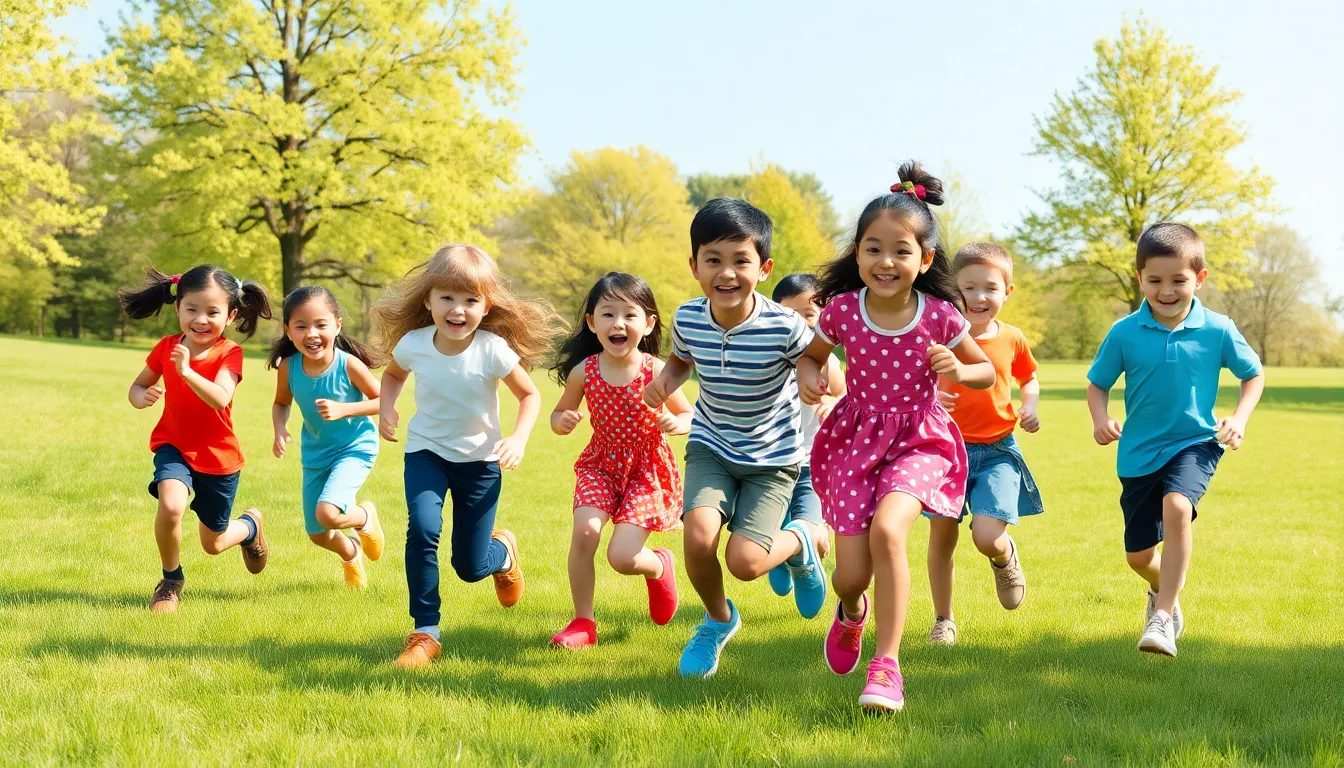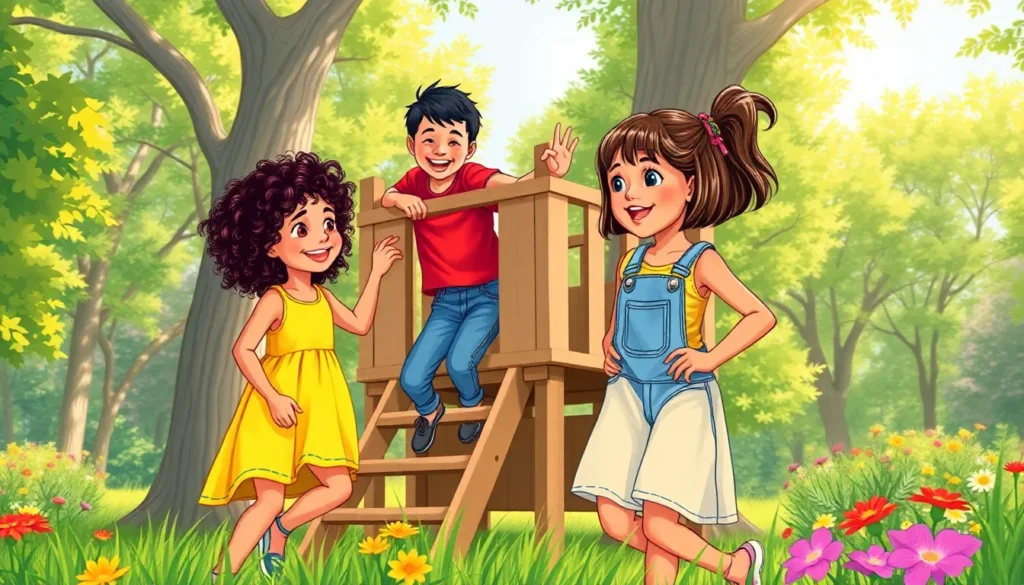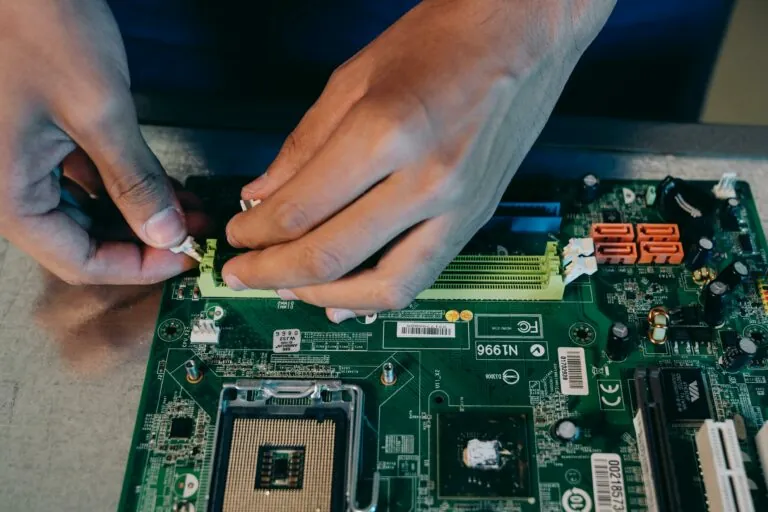Childhood friendships are like the secret sauce of growing up. They shape who kids become and provide a crash course in social skills that even the best adult workshops can’t replicate. From trading snacks to navigating the treacherous waters of playground politics, these early bonds lay the groundwork for future relationships.
But let’s face it: not all friendships are created equal. Some are as solid as a treehouse built by a group of determined kids, while others can crumble faster than a sandcastle at high tide. Understanding the dynamics of these friendships is essential for parents and caregivers who want to help kids thrive in their social circles. Dive into the fascinating world of childhood friendships and discover how these connections influence emotional growth and resilience. After all, who wouldn’t want to unlock the mysteries of the tiny humans who hold the keys to their hearts?
Table of Contents
ToggleUnderstanding Childhood Friendships
Childhood friendships play a crucial role in a child’s development. These early relationships often help shape social skills, teaching children how to communicate, empathize, and resolve conflicts. Bonds formed during this period serve as building blocks for future interactions.
Children experience a range of emotions in these friendships, including joy, jealousy, and disappointment. Navigating these feelings equips them with essential emotional intelligence. Learning to handle various social situations promotes resilience, preparing them for challenges later in life.
Social dynamics frequently shift as children grow. Friends can come and go, resulting in varied experiences that teach adaptability. Parents and caregivers should facilitate conversations around these changes, helping children process their feelings and maintain healthy connections.
Active involvement enhances a child’s capacity to form strong friendships. Encouraging playdates or group activities fosters deeper connections. Observing interactions helps adults understand children’s social circles and identify potential issues.
Diverse friendships allow children to appreciate different perspectives. Such experiences promote inclusivity and understanding in broader societal contexts. Supporting the development of these varied relationships strengthens a child’s social foundation.
Understanding childhood friendships requires recognizing their impact on social and emotional growth. Supporting children through their experiences cultivates skills vital for later relationships. Exploring these dynamics contributes to healthier, more resilient individuals as they progress through various stages of life.
The Importance Of Childhood Friendships

Childhood friendships play a crucial role in shaping emotional and social development. These relationships foster key skills needed later in life.
Emotional Development
Emotional development thrives within the context of childhood friendships. Children express their feelings freely, learning to navigate joys and disappointments. Empathy grows through shared experiences, as they learn to understand others’ perspectives. Conflict resolution becomes a practice ground, offering tools to deal with disputes. Positive emotional connections enhance self-esteem and provide a sense of belonging. By experiencing the ups and downs of friendships, children cultivate resilience and learn to manage their feelings effectively. As they engage with peers, they grasp the importance of emotional support, which serves as a foundation for future relationships.
Social Skills Acquisition
Social skills acquisition occurs naturally within childhood friendships. Communication becomes a daily practice as children share thoughts and feelings with friends. They learn valuable skills like turn-taking and active listening through play. Navigating diverse social situations exposes them to various perspectives and cultural backgrounds. Navigating friendships means facing different challenges, from resolving conflicts to negotiating play activities. They develop teamwork through group dynamics, essential for collaboration later in life. Building these connections leads to improved interpersonal skills, preparing children for interactions with a broader community.
Stages Of Childhood Friendships
Childhood friendships develop through distinct stages, each playing a critical role in social and emotional growth. Understanding these stages allows parents and caregivers to support children’s relationship-building effectively.
Infancy To Early Childhood
During infancy to early childhood, friendships primarily rely on proximity and shared experiences. Children engage with peers through parallel play, where they play alongside each other but may not directly interact. Interactions at this stage often center around activities like sharing toys or engaging in simple games. Verbal communication begins to blossom, allowing them to express basic feelings and needs. Bonds form as children begin to recognize familiar faces, and the foundation for meaningful relationships is laid. This early stage emphasizes the importance of social interactions, emotionally enriching environments, and nurturing support from caregivers.
Middle Childhood
In middle childhood, friendships transform significantly as social skills mature. Children start to seek deeper connections based on mutual interests, trust, and loyalty. Interactions become more complex with increased communication, collaboration, and conflict resolution. Their ability to empathize expands, enabling them to understand others’ feelings. Group dynamics play a crucial role during this period, facilitating teamwork and cooperation among peers. Friendships in this stage often become more exclusive, leading to stronger emotional ties and a sense of belonging. Encouraging participation in group activities helps solidify these connections, fostering social competence and emotional resilience.
Factors Influencing Childhood Friendships
Multiple elements shape childhood friendships, significantly impacting social and emotional growth.
Family Environment
The family environment plays a critical role in friendship development. A supportive family nurtures open communication, establishing trust and respect. When parents model healthy relationships, children learn essential skills like empathy and conflict resolution. Additionally, families that encourage play and interaction cultivate social abilities, helping children form bonds with peers. In homes emphasizing collaboration and teamwork, children adopt similar values within their friendships. This influence secures a strong emotional foundation, benefiting children’s capacity to build meaningful connections.
School Environment
The school environment significantly contributes to friendship dynamics. Schools provide opportunities for social interaction through structured activities, such as group projects and extracurricular programs, fostering teamwork. Positive peer influences in school settings enhance communication and emotional intelligence. A caring and inclusive school culture can lead children to feel accepted and valued, reinforcing their desire to form friendships. Moreover, teachers and staff serve a vital role in guiding social interactions, helping children navigate conflicts effectively. By promoting diverse relationships in school, children learn to respect differences and develop essential social skills for future interactions.
Challenges In Childhood Friendships
Childhood friendships face various challenges that can impact emotional and social development. Understanding these issues helps caregivers support children effectively.
Conflict Resolution
Conflict resolution plays a vital role in shaping childhood friendships. Children encounter disagreements and misunderstandings in their interactions. They demonstrate different levels of communication skills when resolving these conflicts. Some may struggle, leading to unresolved issues and potential social isolation. Engaging with peers allows kids to practice negotiation and empathy. Adults can guide children through conflict resolution by modeling appropriate behaviors. Techniques such as active listening promote understanding and facilitate effective communication. Learning to resolve conflicts positively reinforces relationship-building and strengthens friendships.
Peer Pressure
Peer pressure significantly influences children’s friendships. As children grow, they become increasingly aware of the expectations of their peers. They may feel compelled to conform to group norms, even when those choices conflict with their values. Distinguishing between healthy and negative peer influences remains essential. Some children might engage in risky behaviors to gain acceptance, which can strain or ruin friendships. Encouraging open discussions helps children navigate peer pressure more effectively. Supportive environments allow kids to express concerns and make informed decisions. Parents can help children develop strong decision-making skills, fostering resilience in the face of peer influence.
Childhood friendships play a vital role in shaping a child’s social and emotional landscape. These early connections not only foster essential skills but also lay the groundwork for future relationships. By understanding the dynamics of these friendships, parents and caregivers can actively support children’s growth and resilience.
Encouraging open communication and facilitating social interactions helps children navigate the complexities of relationships. As they learn to manage emotions and resolve conflicts, they build a strong foundation for lifelong connections. Ultimately, nurturing childhood friendships enriches a child’s development and prepares them for the diverse social world ahead.



